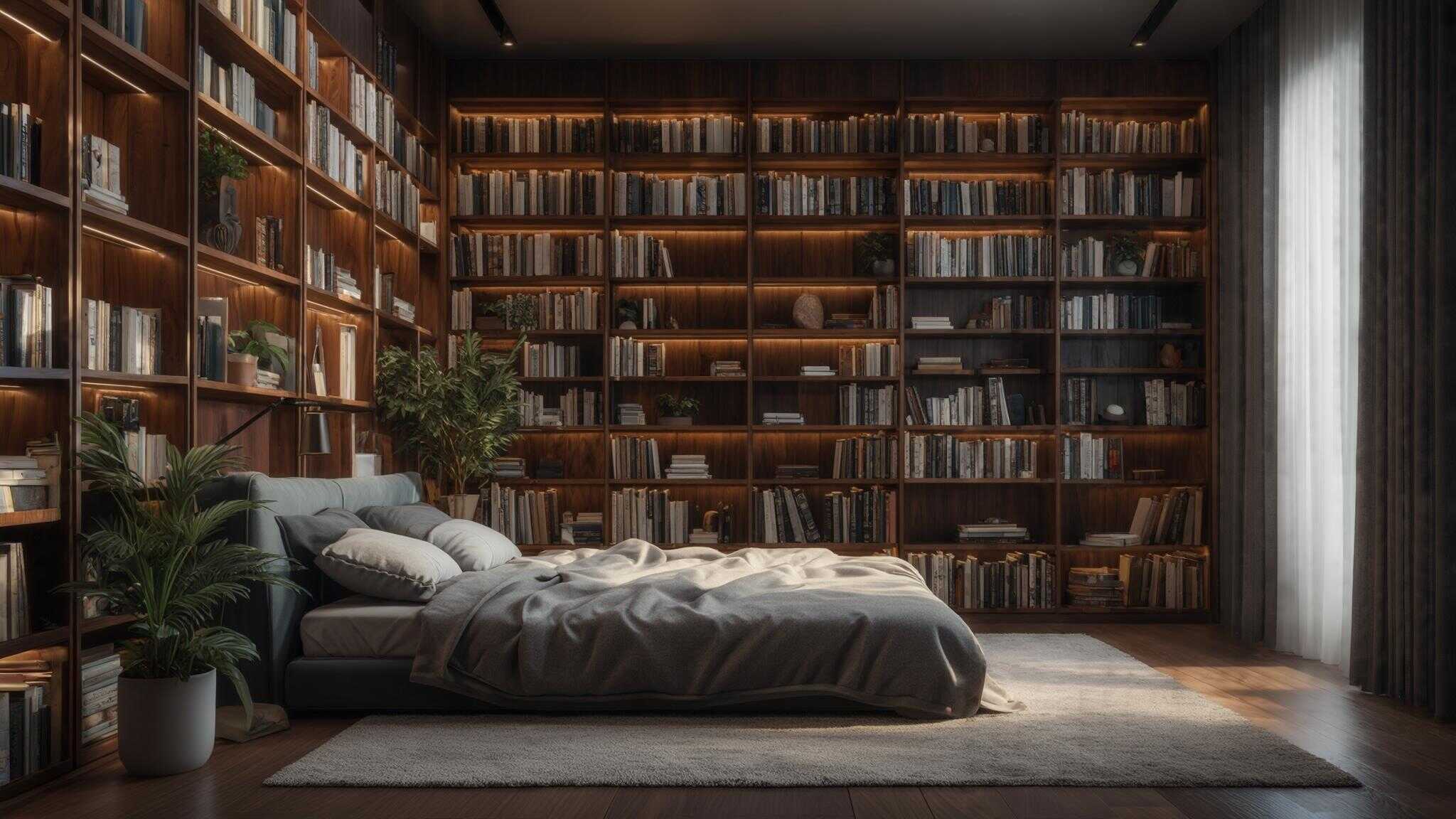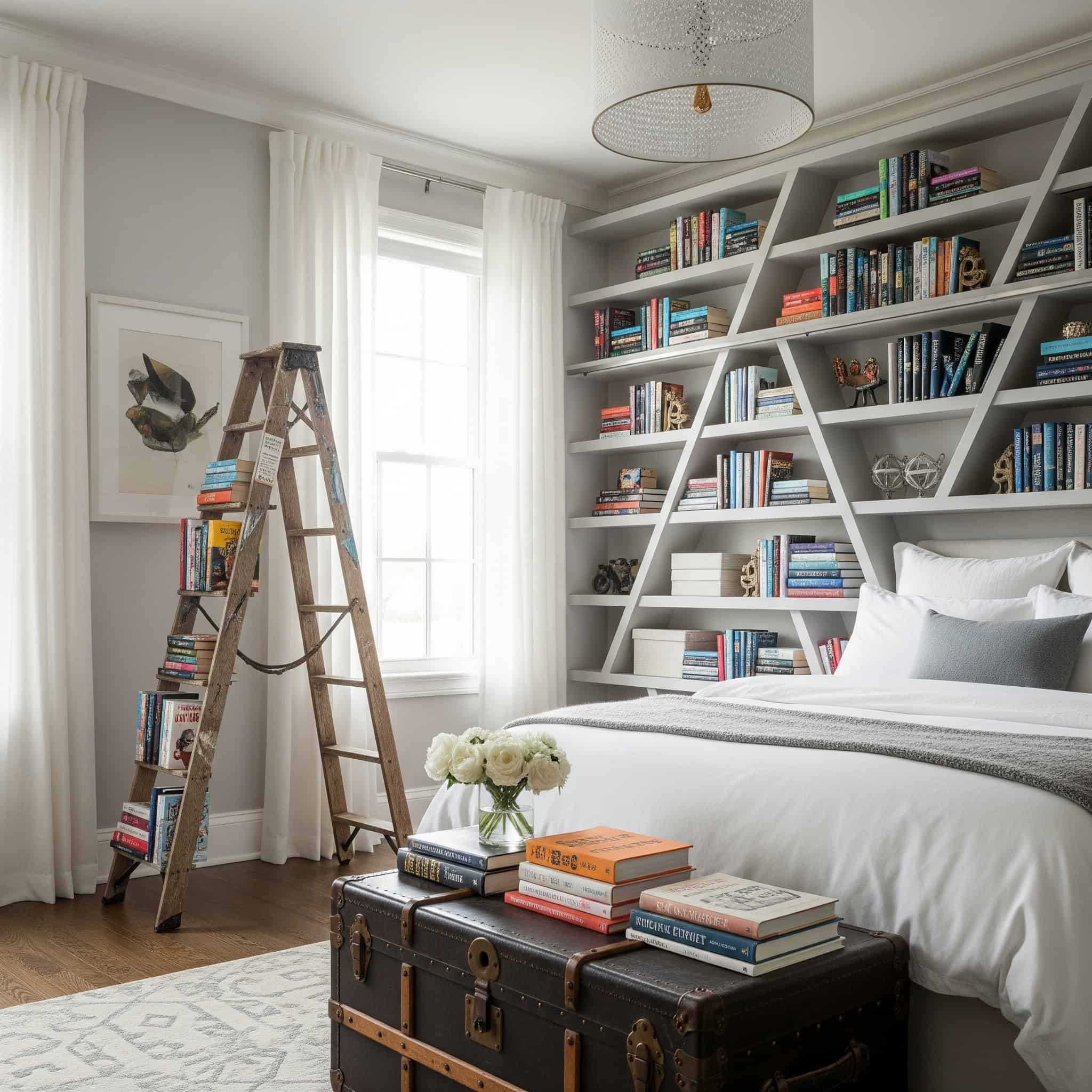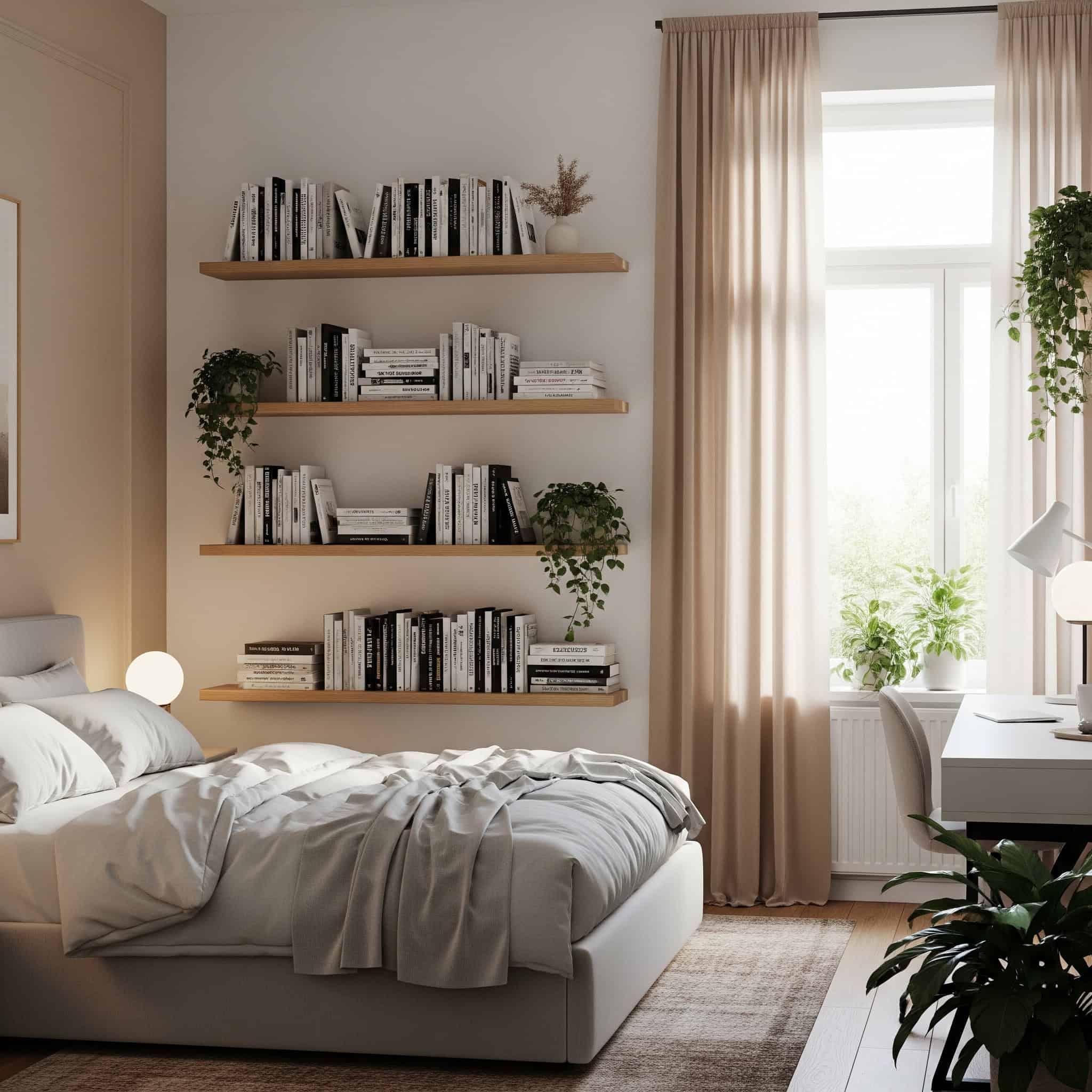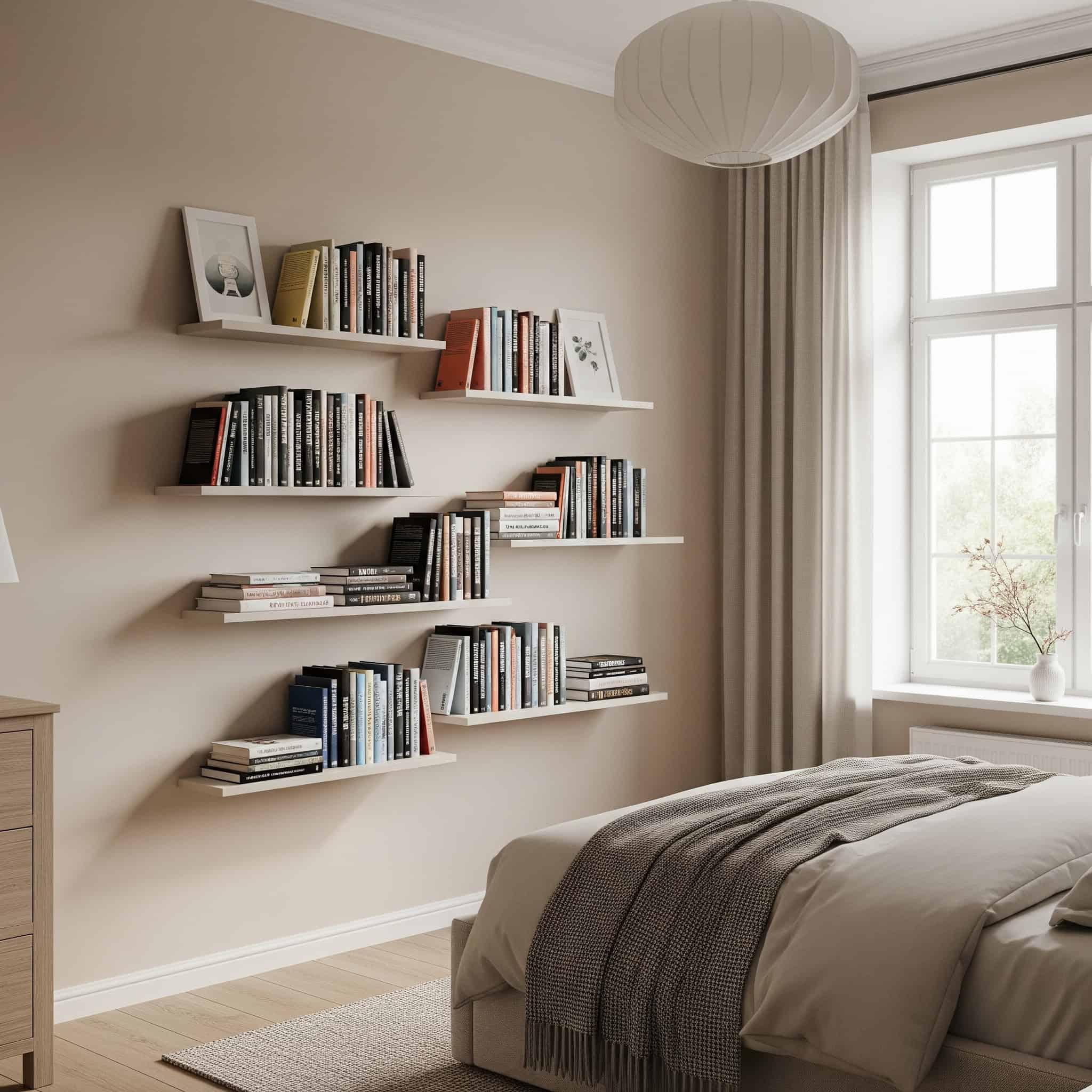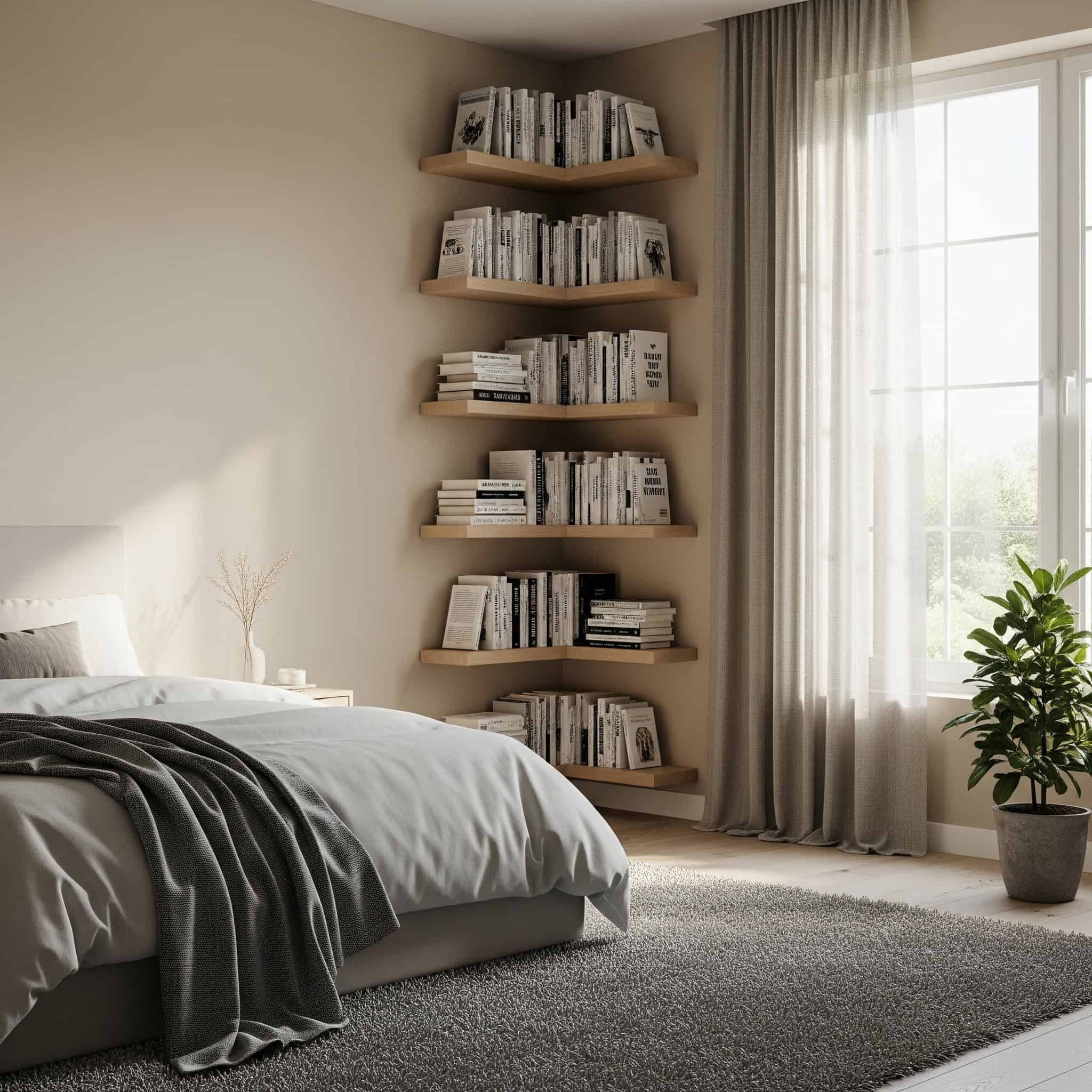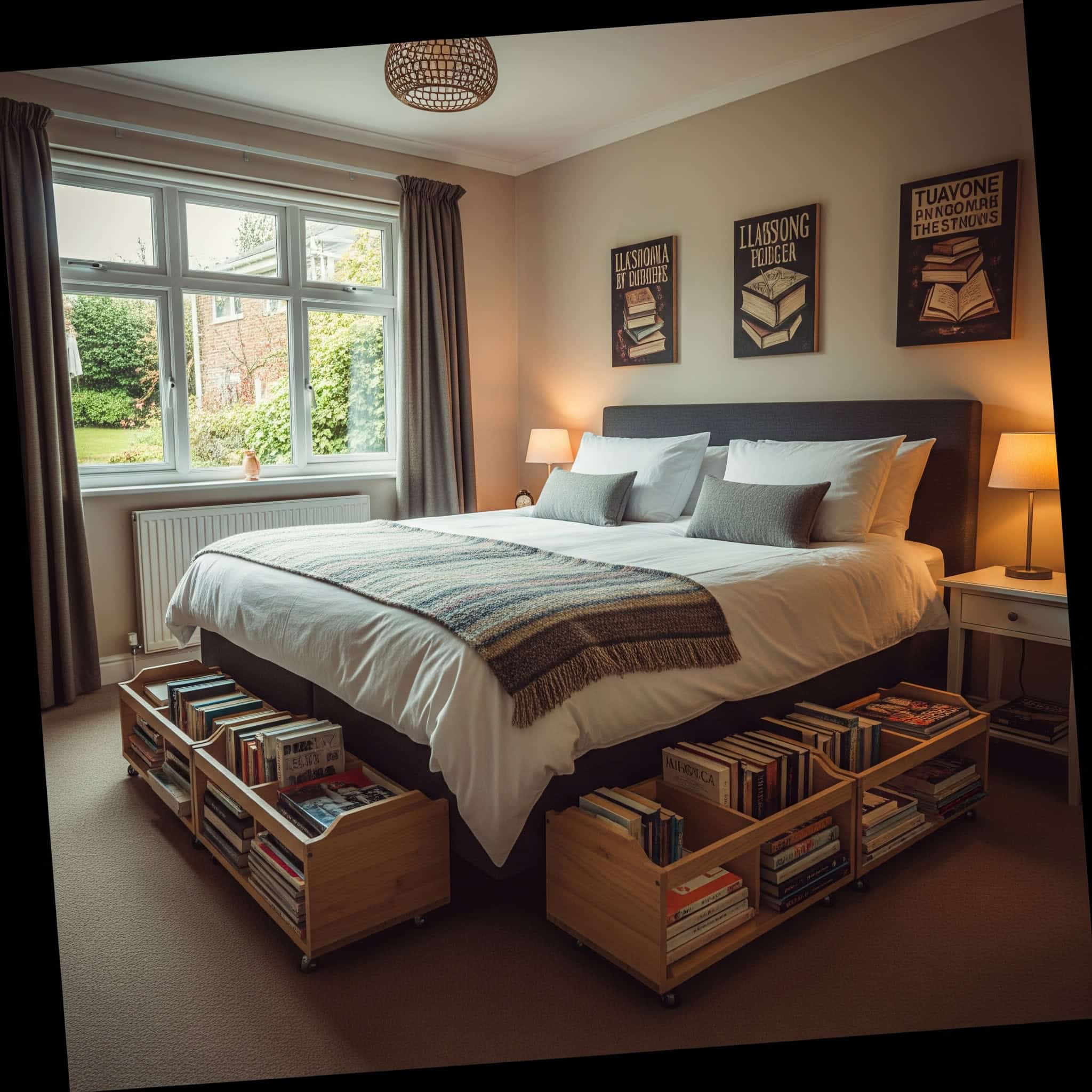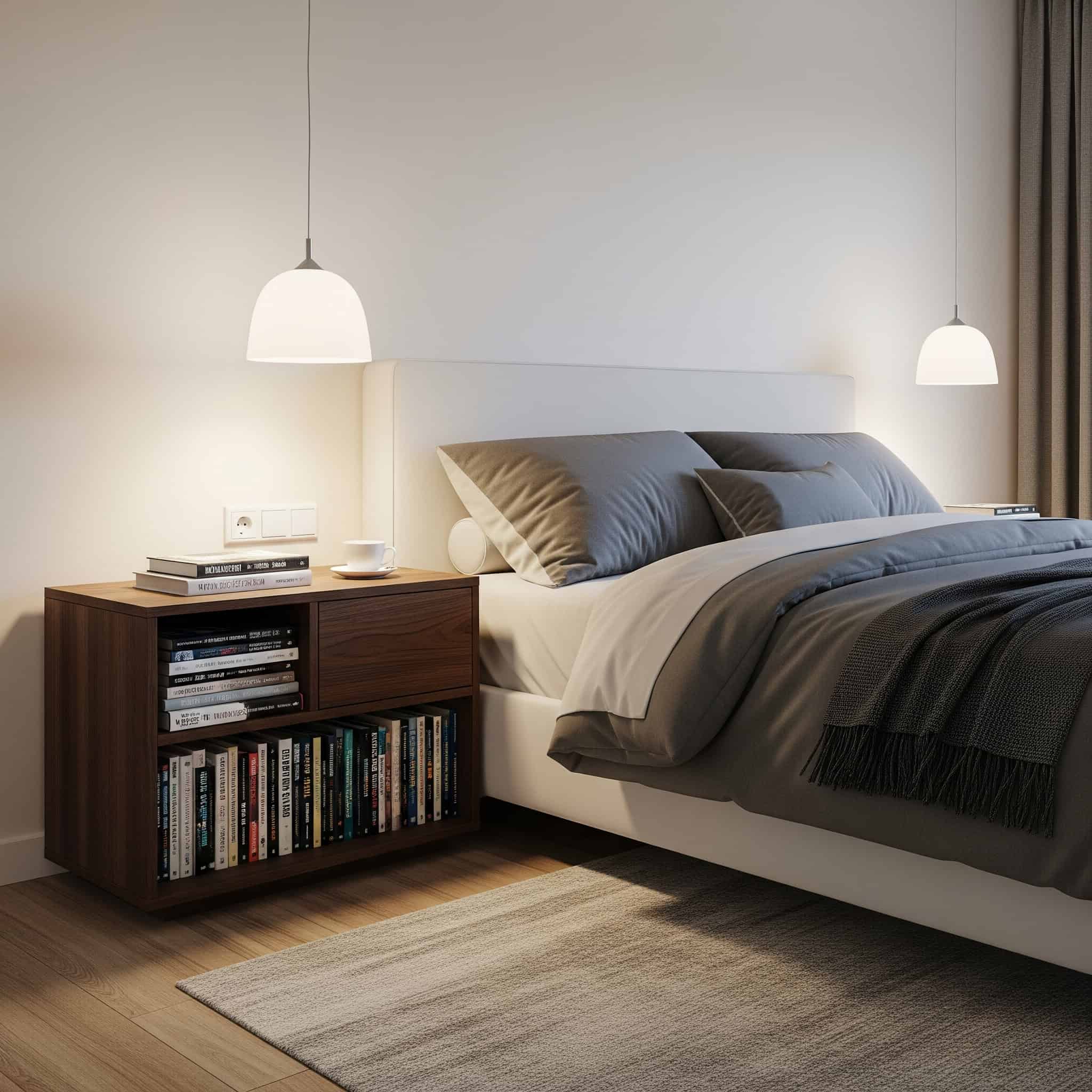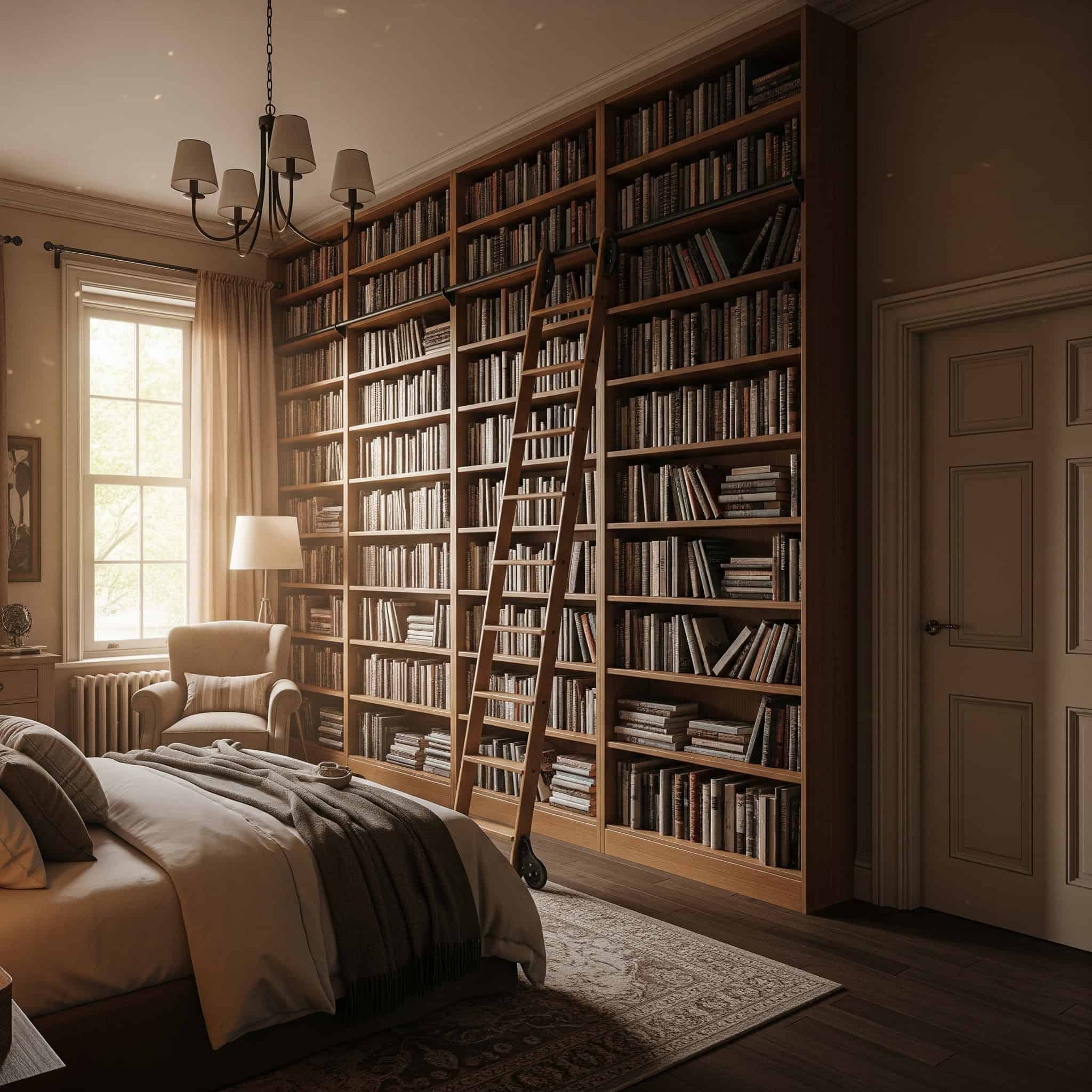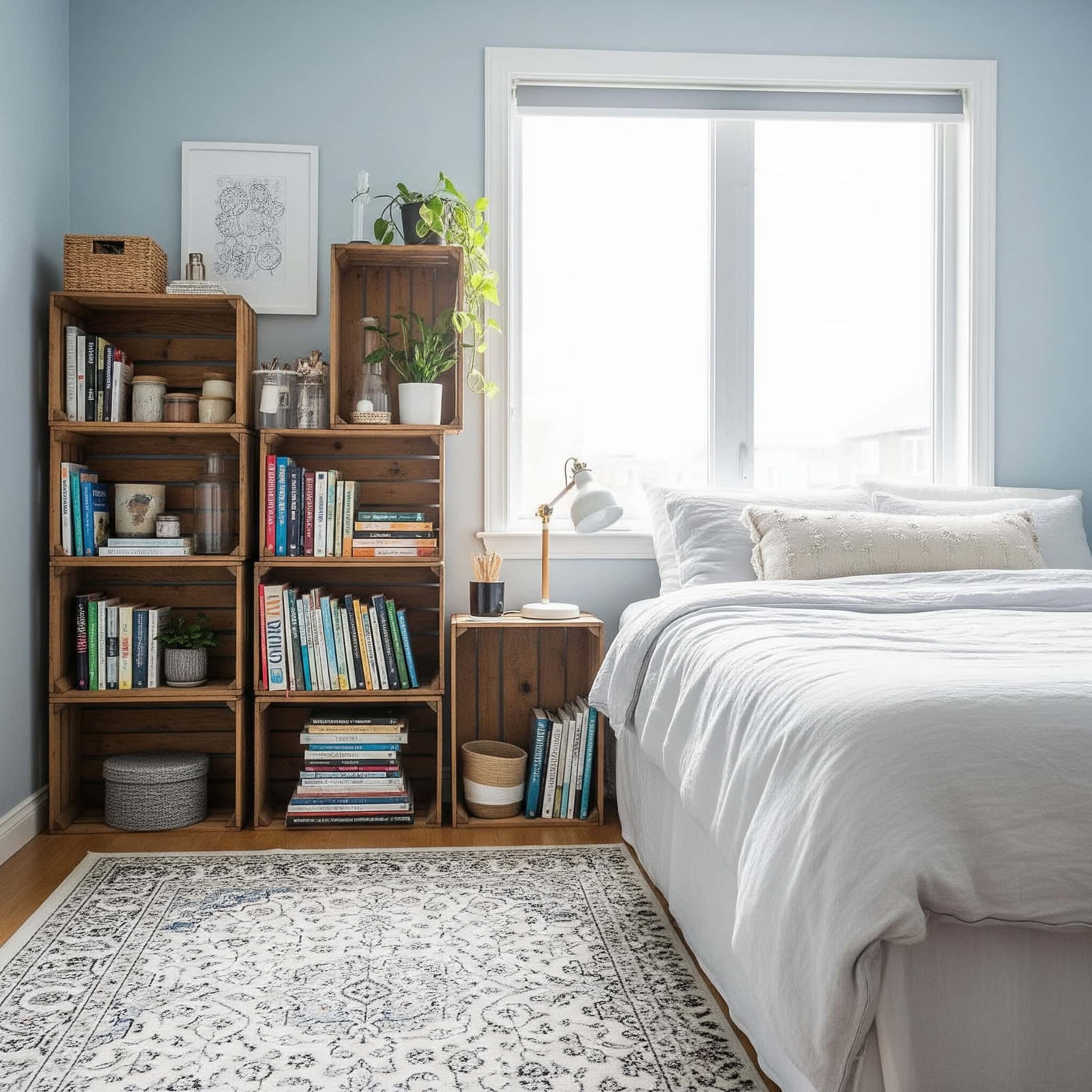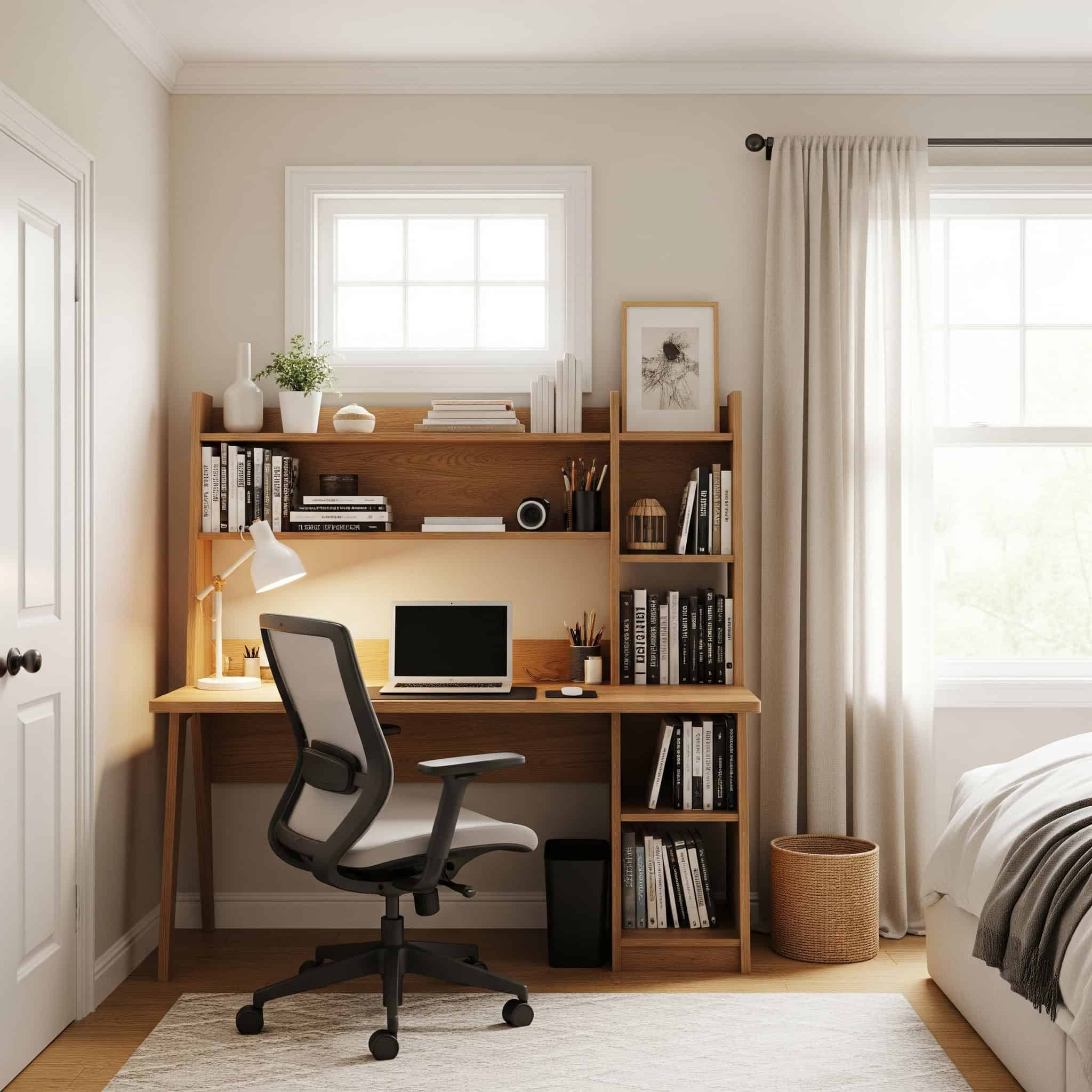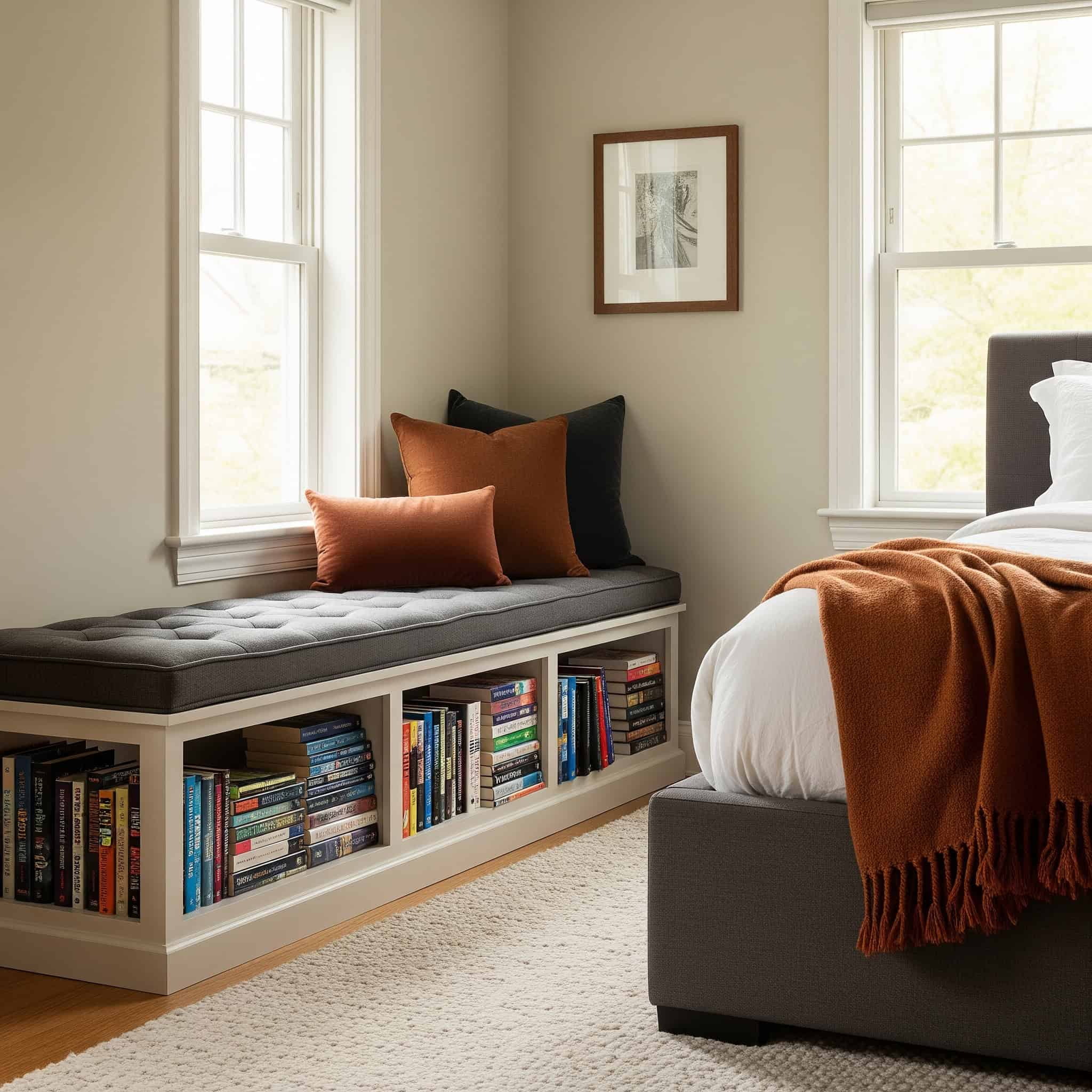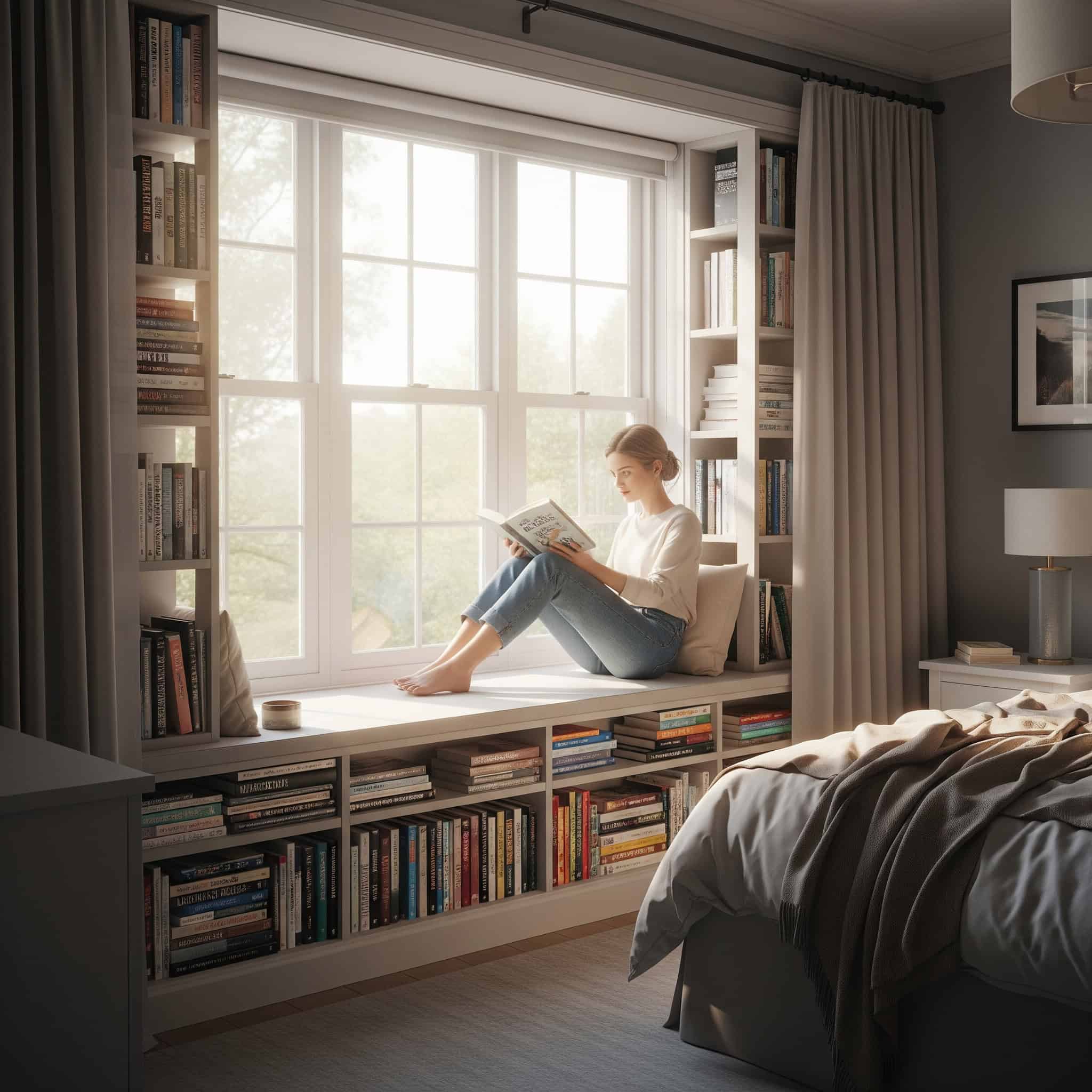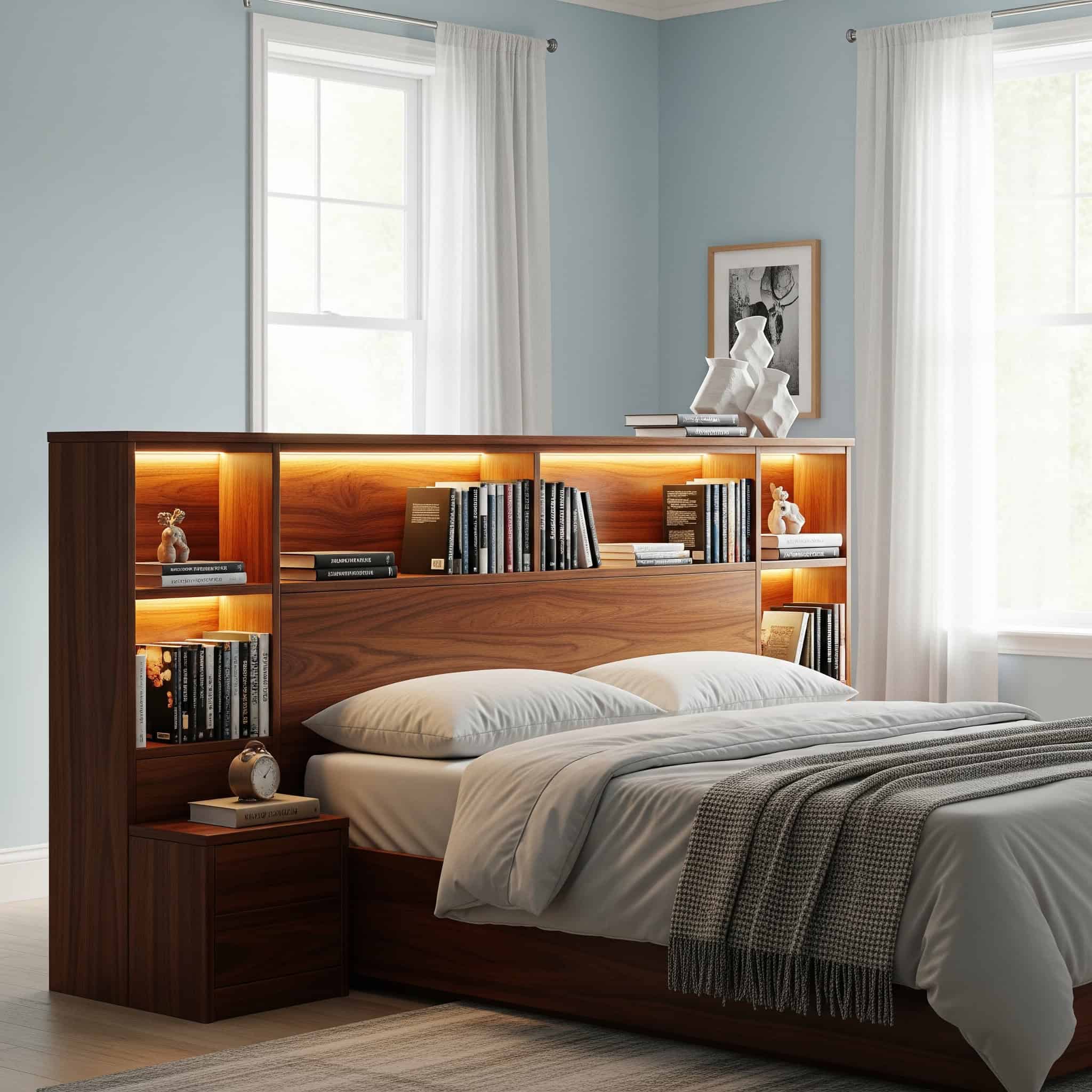25 Ingenious Bedroom Book Storage Ideas for 2025: Maximize Space Without Sacrificing Style
According to a recent survey by the American Library Association, the average book collector owns approximately 138 books, with 42% of those books stored in bedrooms. Finding the right storage solution for your bedroom library can transform both functionality and aesthetics of your personal space. I’ve spent countless hours researching and testing various bedroom book storage options, and I’m excited to share these practical solutions that work for bedrooms of all sizes.
Proper book storage prevents damage from environmental factors like humidity, direct sunlight, and dust accumulation. I’ve seen firsthand how books can yellow and warp when left in poor conditions, which is why strategic placement matters so much.
Strategic book organization in bedrooms improves sleep quality by reducing visual clutter and creating a more peaceful environment. When your books have dedicated homes rather than scattered piles, your brain can actually relax better at night.
Before diving into specific storage solutions, consider how your book collection impacts your bedroom’s overall organization. As noted in our guide on house cleaning checklist, maintaining an organized bedroom with proper storage solutions is essential for both mental wellbeing and home aesthetics.
Table of Contents
-
Key Considerations for Bedroom Book Storage
-
Wall-Mounted Solutions
-
Furniture-Based Storage
-
Vertical Space Maximizers
-
Multifunctional Solutions
-
Creative and Decorative Approaches
-
How Jiffy Junk Can Help Transform Your Space
-
Final Thoughts
Key Considerations for Bedroom Book Storage
Before selecting a storage solution, you need to evaluate several factors that will impact your decision. Your available space, collection size, access needs, and aesthetic preferences all play crucial roles in determining the most suitable option for your bedroom library.
Weight distribution is critical when planning your book storage. Books are surprisingly heavy, with a standard bookshelf potentially supporting 100+ pounds per shelf. I learned this lesson the hard way when my first DIY shelf collapsed under the weight of my hardcover collection!
Future-proofing your storage solution saves money and prevents overcrowding, as the average book collector acquires 12-15 new books annually. Think about how your collection might grow over time and choose options that can expand or adapt with your needs.
|
Storage Factor |
Considerations |
Impact on Decision |
|---|---|---|
|
Room Size |
Small (<120 sq ft) |
Determines scale and type of storage solutions |
|
Collection Size |
Small (<50 books) |
Influences storage capacity needs and expansion options |
|
Access Frequency |
Daily use |
Affects placement height and accessibility requirements |
|
Aesthetic Style |
Modern |
Guides material and design choices for visual harmony |
|
Budget |
Low (<$200) |
Determines between DIY, retail, or custom solutions |
Wall-Mounted Solutions
1. Floating Shelves for Minimalist Appeal
Floating shelves offer a clean, contemporary look while maximizing floor space in smaller bedrooms. These wall-mounted options work particularly well above desks, nightstands, or in unused wall areas to display books without visual heaviness.
Standard floating shelves require proper wall anchoring to support 30-50 pounds of books safely. I always recommend finding studs or using heavy-duty wall anchors – nothing ruins your day quite like books crashing down at 2 AM!
Staggered installation patterns create visual interest while distributing weight across different wall studs. This approach not only looks more dynamic but also prevents overloading any single section of your wall.
2. Wall-to-Wall Shelving for Serious Collectors
For extensive book collections, wall-to-wall shelving transforms an entire wall into a dedicated library space. This dramatic focal point maximizes storage capacity while creating an impressive display that showcases your literary interests.
Custom wall-to-wall installations typically cost $1,200-3,500 depending on materials and complexity. While not the cheapest option, the storage capacity and visual impact often justify the investment for serious readers.
Adjustable shelf heights accommodate books of varying sizes, from paperbacks to oversized art books. This flexibility ensures your shelving system can adapt to your collection rather than forcing you to organize by size alone.
A client in Boston converted their 12-foot bedroom wall into a floor-to-ceiling library using adjustable shelving. The system includes three fixed shelves for stability with six adjustable shelves between them. By painting the shelving unit the same color as the wall (Benjamin Moore’s “Hale Navy”), the books become the focus rather than the storage system itself. The project cost $2,800 for custom carpentry but increased the room’s perceived value by an estimated $5,000 according to a local real estate assessment.
3. Picture Ledge Book Display for Visual Impact
Picture ledges display books with covers facing outward, creating a visually appealing arrangement that doubles as wall art. These narrow shelves work perfectly for showcasing current reads, favorite titles, or books with particularly attractive covers.
Standard picture ledges are 3-4 inches deep, sufficient for displaying books but not deep enough for traditional spine-out storage. This limitation actually becomes a design feature, forcing you to curate what’s displayed rather than stuffing shelves full.
Regular rotation of displayed books prevents UV damage from prolonged exposure to light. I typically swap out my displayed books every month or so, which has the added benefit of keeping my collection feeling fresh and inspiring.
4. Grid Wall System for Customizable Storage
Modular grid systems offer ultimate flexibility with attachable shelves, hooks, and book holders that can be reconfigured as your needs change. This contemporary solution works well in modern bedrooms and adapts easily to evolving collections.
Metal grid systems typically support 15-25 pounds per attachment point, requiring strategic placement for heavier books. I’ve found that distributing weight evenly across multiple attachment points prevents the grid from pulling away from the wall over time.
Modular components allow for expansion and reconfiguration without damaging walls. This adaptability makes grid systems particularly appealing for renters or those who like to frequently refresh their space.
5. Corner Floating Shelves for Awkward Spaces
Corner spaces often go unused, but triangle-shaped floating shelves transform these awkward areas into valuable storage. Creating a vertical tower in bedroom corners maximizes previously wasted space without encroaching on the room’s flow.
Corner installations require precise measurements and secure anchoring at multiple points. The trickiest part is ensuring the shelves are level while properly secured to both walls.
Graduated shelf sizes (larger at bottom, smaller at top) create visual balance while improving stability. This arrangement not only looks more intentional but also prevents top-heavy installations that could tip forward.
Furniture-Based Storage
6. Bookcase Headboard for Bedtime Readers
Bookcase headboards integrate storage directly into your bed frame, placing books within arm’s reach for nighttime reading. This dual-purpose furniture saves space while keeping favorite titles accessible right where you need them.
Integrated headboard storage typically accommodates 30-50 books depending on design. I’ve found this perfect for keeping my current reading rotation and perennial favorites close at hand.
Weight distribution across the entire headboard prevents structural issues common with wall-mounted options. Since the weight is supported by the bed frame rather than wall anchors, these headboards can safely hold more books without risk of failure.
For those considering a bedroom renovation that includes built-in storage solutions, our article on how to clean out an office offers valuable insights on clearing space before installing new furniture pieces like bookcase headboards.
7. Under-Bed Rolling Book Carts for Hidden Storage
The space beneath your bed offers significant storage potential with specialized rolling carts designed for books. These low-profile solutions utilize otherwise wasted space, perfect for seasonal or less frequently accessed titles.
Under-bed clearance of 6-8 inches accommodates most specialized book storage drawers. Before purchasing, I always recommend measuring your bed’s clearance height to ensure a proper fit.
Dust-resistant containers prevent damage to books stored in this often-overlooked space. Look for options with lids or covers to keep your collection clean and protected from the dust bunnies that inevitably gather under beds.
8. Bookcase Room Divider for Spatial Definition
In larger bedrooms, a freestanding bookcase positioned perpendicular to the wall creates a distinct reading nook while providing substantial storage. This strategic placement defines separate areas within your bedroom while maintaining an open feel.
Open-backed bookcases allow light to flow through while still providing visual separation. This approach creates distinct zones without making your room feel smaller or more closed off.
Safety anchoring to walls prevents tipping hazards while maintaining the freestanding appearance. Even when positioned away from walls, I always secure tall bookcases with anti-tip straps or brackets for safety.
In a 225 sq ft master bedroom, I installed a 72″ tall × 36″ wide double-sided bookcase perpendicular to the wall, creating a dedicated reading area in a previously underutilized corner. The open-backed IKEA KALLAX unit ($149) was secured to the wall with L-brackets for stability while still appearing freestanding. The front side holds books organized by genre, while the back side facing the bed displays decorative items and plants. This simple addition effectively created two distinct zones without any construction or permanent changes to the room structure.
9. Nightstand with Book Storage for Bedside Convenience
Specialized nightstands with integrated book storage keep current reads close at hand without requiring additional furniture. These practical pieces maximize functionality in a space you already need to fill.
Vertical magazine rack sides accommodate 8-12 standard paperbacks while maintaining a small footprint. This design works particularly well for paperbacks and smaller hardcovers that you’re actively reading.
Open shelving beneath traditional nightstands typically holds 15-20 books depending on size. I’ve found this arrangement perfect for keeping my “to read next” pile organized and accessible without cluttering my nightstand surface.
10. Ottoman with Book Storage for Discreet Organization
Storage ottomans offer a hidden compartment for books while providing seating and footrest functionality. This multifunctional piece works well for protecting special editions or keeping your collection organized but out of sight.
Hinged-lid storage ottomans typically hold 20-30 books while supporting 250+ pounds of weight. The sturdy construction makes them perfect for bedroom seating that doesn’t scream “book storage.”
Fabric options with stain-resistant treatments protect both the furniture and your book collection. I recommend choosing performance fabrics if you plan to use your ottoman for both seating and storage to ensure longevity.
|
Furniture Storage Solution |
Book Capacity |
Floor Space Required |
Price Range |
Best For |
|---|---|---|---|---|
|
Bookcase Headboard |
30-50 books |
No additional space |
$200-$800 |
Bedtime readers, small rooms |
|
Under-Bed Rolling Carts |
40-100 books |
No visible space |
$40-$150 |
Seasonal collections, limited space |
|
Bookcase Room Divider |
100-300 books |
6-10 sq ft |
$150-$500 |
Large rooms, creating zones |
|
Nightstand with Storage |
15-25 books |
4-6 sq ft |
$80-$300 |
Current reads, small collections |
|
Storage Ottoman |
20-30 books |
4-9 sq ft |
$100-$400 |
Hidden storage, multi-use needs |
Vertical Space Maximizers
11. Ceiling-Height Bookcase with Library Ladder for Drama
Rooms with high ceilings benefit tremendously from floor-to-ceiling bookcases with sliding ladders. This dramatic installation maximizes storage capacity while creating a stunning architectural feature that showcases your entire collection.
Custom ceiling-height installations typically increase storage capacity by 30-40% compared to standard bookcases. The vertical space that often goes unused becomes your storage superpower with this approach.
Rolling ladder hardware requires proper installation into wall studs to support 250+ pounds safely. While the ladder adds both functionality and visual interest, proper installation is crucial for safety when accessing those upper shelves.
When installing floor-to-ceiling bookcases, you may need to remove old furniture first. Our furniture removal guide provides detailed information on how to safely remove and dispose of large items to make room for your new storage solution.
12. Behind-Door Bookshelf for Overlooked Spaces
The wall space behind your bedroom door offers surprising storage potential with narrow shelving units. This often-overlooked area can accommodate dozens of books without impacting the room’s layout or flow.
Narrow shelving units (4-6 inches deep) fit behind most doors without interfering with door function. I’ve installed these in several bedrooms and been amazed at how many paperbacks fit in this otherwise wasted space.
Door stops prevent damage to both the door and the shelving unit during normal use. This small addition is crucial for protecting both your door and your books when the door swings open quickly.
13. Vertical Book Tower for Tight Spaces
Tall, narrow bookcases with minimal footprints fit into tight spaces between furniture pieces. These vertical towers provide substantial storage capacity relative to their small floor space requirements.
Standard vertical towers (12-18 inches wide) typically hold 75-100 paperbacks while using minimal floor space. I’ve squeezed these slim towers into corners and narrow spaces between windows with great success.
Wall anchoring prevents tipping hazards, particularly important in earthquake-prone regions. Even the narrowest towers should be secured to prevent accidents, especially in homes with children or pets.
14. Floor-to-Ceiling Book Poles for Rental-Friendly Options
Tension-mounted poles with adjustable shelves fit between floor and ceiling without requiring permanent installation. This rental-friendly option provides substantial storage without damaging walls, perfect for temporary living situations.
Spring-loaded tension poles typically support 30-40 pounds per shelf without wall attachments. The pressure-fit design distributes weight between floor and ceiling rather than relying on wall anchors.
Rubber end caps prevent ceiling and floor damage while providing necessary friction. These small components are crucial for both protecting your home and ensuring the stability of your shelving system.
15. Stacked Crate Bookcase for Budget-Friendly Storage
Wooden or metal crates secured together create a customizable, budget-friendly bookcase with industrial or rustic appeal. This DIY-friendly option allows for personalization while providing substantial storage capacity.
Standard wooden crates hold approximately 15-20 books each when properly reinforced. The key is securing them together properly to create a stable unit that won’t shift or collapse under weight.
Securing crates to each other and to the wall prevents structural failures under book weight. I always use both horizontal and vertical attachment points to create a truly stable structure.
For a budget-friendly solution in a teen’s bedroom, I transformed six wooden wine crates ($8 each from a local liquor store) into a customized bookshelf. After sanding and staining the crates with Minwax “Classic Gray,” I arranged them in an asymmetrical pattern and secured them together with steel mending plates. The entire project cost under $75 including hardware and finish, took just one weekend to complete, and holds approximately 100 paperbacks. For safety, the completed unit was anchored to the wall with two L-brackets hidden behind the books.
|
Vertical Storage Solution |
Installation Difficulty |
Reversibility |
Weight Capacity |
Ideal For |
|---|---|---|---|---|
|
Ceiling-Height Bookcase |
High (Professional recommended) |
Permanent |
50-75 lbs per shelf |
High ceilings, large collections |
|
Behind-Door Shelving |
Low |
Semi-permanent |
30-40 lbs total |
Small spaces, paperbacks |
|
Vertical Book Tower |
Low |
Movable (with anchoring) |
75-100 lbs total |
Narrow spaces, corners |
|
Floor-to-Ceiling Poles |
Medium |
Fully reversible |
30-40 lbs per shelf |
Rentals, temporary situations |
|
Stacked Crate Bookcase |
Low (DIY friendly) |
Semi-permanent |
15-20 lbs per crate |
Budget constraints, rustic style |
Multifunctional Solutions
16. Reading Nook with Integrated Shelving for Dedicated Space
Window seats flanked by built-in bookshelves create the perfect reading retreat within your bedroom. This dedicated space combines comfortable seating with convenient storage, encouraging regular reading habits.
Window seat installations typically include 20-30 cubic feet of storage beneath the seating area. This hidden storage is perfect for seasonal books or less frequently accessed titles.
Proper ventilation prevents moisture buildup that could damage books stored in enclosed bench compartments. Small vent holes or gaps in the construction allow air circulation while keeping books protected and dust-free.
Before creating a reading nook with integrated shelving, you might need to clear out existing clutter. Our guide on how to get rid of clutter provides practical strategies for preparing your space for new built-in features.
17. Desk-Bookshelf Combo for Work-From-Home Setups
Writing desks with attached vertical shelving serve dual purposes in bedrooms that double as home offices. This practical combination keeps reference materials within reach while you work without requiring additional furniture pieces.
Integrated desk-shelf combinations typically provide 15-25 linear feet of book storage. Having your reference materials organized above or beside your workspace improves productivity and reduces clutter.
Weight distribution considerations require heavier books to be stored on lower shelves for stability. I always place my heaviest books and binders on the bottom shelves to prevent the unit from becoming top-heavy and unstable.
18. Rolling Library Cart for Flexible Storage
Three-tiered metal carts on wheels provide mobile book storage that adapts to changing needs. These flexible units move throughout your bedroom as needed, perfect for current reading projects or displaying special collections.
Standard rolling carts support 30-50 pounds per shelf while maintaining mobility. The key is distributing weight evenly to prevent tipping when rolling the cart from place to place.
Locking wheels prevent unwanted movement once positioned in the desired location. This feature is especially important if you’re using the cart on hardwood or tile floors where it might slide.
I’ve found these carts particularly useful for book storage ideas that need to adapt to changing circumstances. My cart moves between my bedside, reading chair, and desk depending on what I’m working on or reading at the moment.
19. Book Storage Bench for Foot-of-Bed Organization
Padded benches with open shelving underneath provide seating at the foot of your bed while storing books. This multifunctional piece maximizes space utility in larger bedrooms while creating a convenient reading spot.
Typical storage benches accommodate 30-40 books while supporting 300+ pounds of seating weight. The dual functionality makes them an efficient use of both floor space and budget.
Hinged-top versions offer additional concealed storage for protecting valuable editions. I prefer these for storing special collections or first editions that need extra protection from dust and light.
20. Convertible Ladder Shelf/Desk for Small Spaces
Leaning ladder-style shelves with fold-down desktop sections provide both display space and a workspace in compact bedrooms. This space-efficient design offers multiple functions without overwhelming smaller rooms.
Fold-down desktop sections typically support 30-40 pounds when in use. This is sufficient for a laptop, books, and writing materials without risking structural failure.
Angled design provides visual interest while requiring secure attachment to wall for stability. The leaning design creates a lighter visual footprint than traditional bookcases while still providing substantial storage.
When implementing space-saving solutions like convertible ladder shelves, you might need to remove old furniture first. Our used furniture pickup disposal service can help clear out unwanted items to make room for your new multifunctional pieces.
Creative and Decorative Approaches
21. Repurposed Vintage Suitcases for Nostalgic Storage
Stacked vintage suitcases on stands create unique storage with nostalgic appeal. This unexpected solution protects books from dust while adding character and historical interest to your bedroom décor.
Reinforced vintage suitcases typically hold 15-20 books while maintaining structural integrity. The key is finding pieces that are structurally sound or reinforcing them appropriately for the weight of books.
Proper cleaning and lining prevent acid transfer from old materials to book pages. I always line vintage suitcases with acid-free paper before storing books to prevent damage from aging materials.
22. Hanging Rope Shelves for Visual Interest
Wooden shelves suspended from the ceiling by decorative ropes create unexpected storage with strong visual impact. This distinctive approach draws attention while providing practical book display space.
Ceiling-mounted rope shelves typically support 10-15 pounds per shelf when properly installed. The weight capacity is lower than traditional shelving, making them better suited for paperbacks or curated displays.
Marine-grade rope prevents stretching and fraying under constant weight. This material choice ensures your shelves remain level and secure over time rather than sagging or failing.
23. Book Display Windowsill Extension for Natural Light
Custom shelves extending from windowsills create display space without blocking natural light. This clever solution utilizes existing architectural features while creating a charming spot for current reads.
Window extensions typically extend 8-12 inches inward without compromising window function. The key is designing them to work with your window operation rather than interfering with it.
UV-resistant materials prevent sun damage to both the shelf and displayed books. I recommend rotating books regularly or using UV-filtering window film to protect your collection from fading.
In a Brooklyn apartment with limited wall space but generous windows, I designed a custom windowsill extension using 3/4-inch maple plywood cut to extend the existing 4-inch sill to a total depth of 14 inches. The extension was secured with L-brackets underneath and finished with the same white semi-gloss paint as the original windowsill. This simple modification created display space for approximately 20 books with covers facing outward, while positioning them to benefit from natural light without direct sun exposure. The total cost was under $50 for materials, and the installation took less than 2 hours while requiring no permanent alterations to the rental property.
These book storage ideas can transform how you interact with your collection, making books more accessible while enhancing your room’s aesthetic appeal.
24. Bookshelf Wallpaper Backdrop for Visual Expansion
Installing actual shelving over trompe l’oeil bookshelf wallpaper creates an illusion of a more extensive library. This creative approach provides real storage while visually expanding your collection through optical illusion.
High-quality bookshelf wallpaper costs $75-150 per roll and creates the illusion of hundreds of books. The visual impact is immediate and dramatic, making even a small collection look more substantial.
Actual shelving installed over wallpaper should align with printed shelves for maximum visual effect. This careful alignment creates a seamless transition between real and printed books, enhancing the illusion.
25. Book Storage Headboard with Integrated Lighting for Nighttime Reading
Custom headboards with book cubbies and built-in LED reading lights create the ultimate bedtime reading setup. This specialized solution combines storage, lighting, and comfort in one thoughtfully designed piece.
Integrated LED lighting systems typically operate for 30,000+ hours before requiring replacement. This longevity means you won’t be climbing behind your bed to change bulbs frequently.
Recessed lighting prevents heat damage to books while providing focused illumination for reading. The directional light allows for comfortable reading without disturbing your partner or flooding the room with brightness.
These book storage ideas can transform not just how you store your collection, but how you experience and enjoy it daily.
How Jiffy Junk Can Help Transform Your Space
Implementing new book storage often requires removing old furniture or clearing clutter first. Jiffy Junk specializes in residential junk removal, helping you reclaim your bedroom space efficiently. Their White Glove Treatment ensures all unwanted items are removed carefully, leaving your room ready for your new storage system.
Professional junk removal services like Jiffy Junk prioritize donation and recycling, diverting usable items from landfills. Your old furniture and shelving units won’t just end up in a dump – they’ll find new homes or be properly recycled whenever possible.
Same-day and next-day service options allow for quick transformation of your space without disrupting your schedule. I’ve used their services before major bedroom renovations and been impressed with how quickly they can clear a space for new installations.
When preparing for a bedroom transformation with new book storage ideas, you might need to clear out existing furniture and clutter. Our white glove junk removal home cleanout services offer a comprehensive solution for removing unwanted items and preparing your space for new installations.
Final Thoughts
Creating effective book storage in your bedroom balances practical considerations with personal style preferences. The right solution depends on your specific needs, space constraints, and how you interact with your collection. Whether you choose built-in shelving or mobile carts, the perfect storage system enhances both your bedroom’s functionality and your reading experience.
Regular maintenance of book storage systems prevents structural issues and protects your collection. I check my shelves quarterly for sagging, loose hardware, or dust accumulation to keep both my books and storage in top condition.
Periodic reorganization of your books based on reading patterns improves accessibility and enjoyment. I’ve found that my reading habits change seasonally, so I adjust my book storage ideas and arrangements accordingly – keeping summer beach reads accessible in warmer months and heavier classics closer at hand during winter.
Have you implemented any of these storage solutions in your own bedroom? Which approach best suits your reading habits and space constraints? The perfect book storage system is one that not only protects your collection but makes you excited to reach for your next great read.
